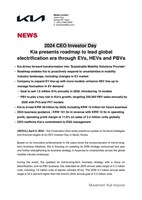Fintech PR
AACSB Highlights 21 Novel Approaches to Business School Collaborations and Their Impact

 Reading Time: 2 minutes
Reading Time: 2 minutes
The complex needs of business, government, and society must be addressed through multidisciplinary, dynamic, and impactful partnerships. Today, AACSB International (AACSB)—the world’s largest business education network—recognizes 21 business school collaborations as highlights of its 2019 Innovations That Inspire challenge.
An annual initiative, the challenge recognizes institutions from around the world that serve as champions of change in the business education landscape. This year’s focus emphasizes co-creation of knowledge—one of five opportunities identified in AACSB’s Collective Vision for Business Education. With research and thought leadership as a foundation, the highlighted institutions are engaging in a wide range of collaborative partnerships to support new curriculum, establish new products or services, and impact industry and government policy.
Included among the highlighted innovations is UNSW Business School’s Sandbox Method for Transformative Research, a translational, multidisciplinary research methodology for co-creating business and social impact that aims to bridge the academic-practice gap and provide a platform for high-impact research. At Monash University Malaysia, the Gerontechnology Laboratory was established to deepen awareness and understanding of the health, well-being, active aging, and safe working and living of older adults through assistive technology-based research. Likewise in the Philippines, the Asian Institute of Management’s ACCeSs@AIM seeks to help grow businesses, improve developing Asian economies, and build the Philippines’ data analytics capacity.
“Business schools that engage across disciplines and with industry, inside and outside the traditional bounds of business and management, exemplify AACSB’s vision for the future of business education,” said Thomas R. Robinson, president and CEO of AACSB. “We are honored to recognize these 21 business schools as they lead by example, emphasizing their own areas of expertise and embracing collaborative approaches, all while addressing critical issues to drive social change.”
Now in its fourth year, the Innovations That Inspire challenge has highlighted more than 100 business school efforts that exemplify forward-looking approaches to education, research, community engagement or outreach, and leadership. To date, members of AACSB’s Business Education Alliance have shared more than 800 innovations, creating a robust repository in AACSB’s DataDirect system to inform and inspire fellow members and the industry.
For an overview of all featured innovations, visit aacsb.edu/innovations-that-inspire.
SOURCE AACSB International
Fintech PR
Invitation to presentation of EQT AB’s Q1 Announcement 2024
STOCKHOLM, April 5, 2024 /PRNewswire/ — EQT AB’s Q1 Announcement 2024 will be published on Thursday 18 April 2024 at approximately 07:30 CEST. EQT will host a conference call at 08:30 CEST to present the report, followed by a Q&A session.
The presentation and a video link for the webcast will be available here from the time of the publication of the Q1 Announcement.
To participate by phone and ask questions during the Q&A, please register here in advance. Upon registration, you will receive your personal dial-in details.
The webcast can be followed live here and a recording will be available afterwards.
Information on EQT AB’s financial reporting
The EQT AB Group has a long-term business model founded on a promise to its fund investors to invest capital, drive value creation and create consistent attractive returns over a 5 to 10-year horizon. The Group’s financial model is primarily affected by the size of its fee-generating assets under management, the performance of the EQT funds and its ability to recruit and retain top talent.
The Group operates in a market driven by long-term trends and thus believes quarterly financial statements are less relevant for investors. However, in order to provide the market with relevant and suitable information about the Group’s development, EQT publishes quarterly announcements with key operating numbers that are relevant for the business performance (taking Nasdaq’s guidance note for preparing interim management statements into consideration). In addition, a half-year report and a year-end report including financial statements and further information relevant for investors is published. Finally, EQT also publishes an annual report including sustainability reporting.
Contact
Olof Svensson, Head of Shareholder Relations, +46 72 989 09 15
EQT Shareholder Relations, [email protected]
Rickard Buch, Head of Corporate Communications, +46 72 989 09 11
EQT Press Office, [email protected], +46 8 506 55 334
This information was brought to you by Cision http://news.cision.com
https://news.cision.com/eqt/r/invitation-to-presentation-of-eqt-ab-s-q1-announcement-2024,c3956826
The following files are available for download:
|
Invitation to presentation of EQT AB’s Q1 Announcement 2024 |
|
|
EQT AB Group |
View original content:https://www.prnewswire.co.uk/news-releases/invitation-to-presentation-of-eqt-abs-q1-announcement-2024-302109147.html

Fintech PR
Kia presents roadmap to lead global electrification era through EVs, HEVs and PBVs

- Kia drives forward transformation into ‘Sustainable Mobility Solutions Provider’
- Roadmap enables Kia to proactively respond to uncertainties in mobility industry landscape, including changes in EV market
- Company to expand EV line-up with more models; enhance HEV line-up to manage fluctuation in EV demand
- Goal to sell 1.6 million EVs annually in 2030, introducing 15 models
- PBV to play a key role in Kia’s growth, targeting 250,000 PBV sales annually by 2030 with PV5 and PV7 models
- Kia to invest KRW 38 trillion by 2028, including KRW 15 trillion for future business
- 2024 business guidance : KRW 101 tln in revenue with KRW 12 tln in operating profit; operating profit margin of 11.9% on sales of 3.2 million units globally
- CEO reaffirms Kia’s commitment to ESG management
SEOUL, South Korea, April 5, 2024 /PRNewswire/ — Kia Corporation (Kia) today shared an update on its future strategies and financial targets at its CEO Investor Day in Seoul, Korea.
Based on its innovative achievements in the years since the announcement of mid-to-long-term business initiatives, Kia is focusing on updating its 2030 strategy announced last year and further strengthening its business strategy in response to uncertainties across the global mobility industry landscape.
During the event, Kia updated its mid-to-long-term business strategy with a focus on electrification, and its PBV business. Kia reiterated its 2030 annual sales target of 4.3 million units, including 1.6 million units of electric vehicles (EVs). The 2030 4.3 million annual sales target is 34.4 percent higher than the brand’s 2024 annual goal of 3.2 million units.
The company also plans to become a leading EV brand by selling a higher percentage of electrified models among its total sales, including hybrid electric vehicles (HEV), plug-in hybrid (PHEV), and battery EVs, projecting electrified model sales of 2.48 million units annually or 58 percent of Kia’s total sales in 2030.
“Following our successful brand relaunch in 2021, Kia is enhancing its global business strategy to further the establishment of an innovative EV line-up and accelerate the company’s transition to a sustainable mobility solutions provider,” said Ho Sung Song, President and CEO of Kia. “By responding effectively to changes in the mobility market and efficiently implementing mid-to-long-term strategies, Kia is strengthening its brand commitment to the wellbeing of customers, communities, the global society, and the environment.”
Photo – https://mma.prnewswire.com/media/2380039/Photo_1__2024_CEO_Investor_Day.jpg
PDF – https://mma.prnewswire.com/media/2380040/Press_Release__2024_Kia_CEO_Investor_Day_240405.pdf
![]() View original content to download multimedia:https://www.prnewswire.co.uk/news-releases/kia-presents-roadmap-to-lead-global-electrification-era-through-evs-hevs-and-pbvs-302109142.html
View original content to download multimedia:https://www.prnewswire.co.uk/news-releases/kia-presents-roadmap-to-lead-global-electrification-era-through-evs-hevs-and-pbvs-302109142.html

Fintech PR
BioVaxys Technology Corp. Provides Bi-Weekly MCTO Status Update
VANCOUVER, BC, April 4, 2024 /PRNewswire/ — BioVaxys Technology Corp. (CSE: BIOV) (FRA: 5LB) (OTCQB: BVAXF) (the “Company“) is providing this bi-weekly update on the status of the management cease trade order granted on February 29, 2024 (the “MCTO“), by its principal regulator, the Ontario Securities Commission (the “OSC“), under National Policy 12-203 – Management Cease Trade Orders (“NP 12-203“), following the Company’s announcement on February 21, 2024 (the “Default Announcement“), that it was unable to file its audited annual financial statements for the year ended October 31, 2023, its management’s discussion and analysis of financial statements for the year ended October 31, 2023, its annual information form for the year ended October 31, 2023, and related filings (collectively, the “Required Annual Filings“). Under National Instrument 51-102, the Required Annual Filings were required to be made no later than February 28, 2024.
As a result of the delay in filing the Required Annual Filings, the Company was unable to file its interim financial statements for the three months ended January 31, 2024, its management’s discussion and analysis of financial statements for the three months ended January 31, 2024, and related filings (collectively, the “Required Interim Filings“). Under National Instrument 51-102, the Required Interim Filings were required to be made no later than April 1, 2024.
The Company anticipates filing the Required Annual Filings by April 30, 2024. The auditor of the Company requires additional time to complete its audit of the Company, including the Company’s recent acquisition of all intellectual property, immunotherapeutics platform technologies, and clinical stage assets of the former IMV Inc. that closed on February 16, 2024. In addition, the Company anticipates filing the Required Interim Filings immediately after the filing of the Required Annual Filings.
Except as herein disclosed, there are no material changes to the information contained in the Default Announcement. In addition, (i) the Company is satisfying and confirms that it intends to continue to satisfy the provisions of the alternative information guidelines under NP 12-203 and issue bi-weekly default status reports for so long as the delay in filing the Required Annual Filings and/or Required Interim Filings is continuing, each of which will be issued in the form of a press release; (ii) the Company does not have any information at this time regarding any anticipated specified default subsequent to the default in filing the Required Annual Filings and Required Interim Filings; (iii) the Company is not subject to any insolvency proceedings; and (iv) there is no material information concerning the affairs of the Company that has not been generally disclosed.
About BioVaxys Technology Corp.
BioVaxys Technology Corp. (www.biovaxys.com), a biopharmaceuticals company registered in British Columbia, Canada, is a clinical-stage biopharmaceutical company dedicated to improving patient lives with novel immunotherapies based on the DPX™ immune-educating technology platform and it’s HapTenix© ‘neoantigen’ tumor cell construct platform, for treating cancers, infectious disease, antigen desensitization, and other immunological fields. The Company’s clinical stage pipeline includes maveropepimut-S which is in Phase II clinical development for advanced Relapsed-Refractory Diffuse Large B Cell Lymphoma (DLBCL) and platinum resistant ovarian cancer, and BVX-0918, a personalized immunotherapeutic vaccine using it proprietary HapTenix© ‘neoantigen’ tumor cell construct platform which is soon to enter Phase I in Spain for treating refractive late-stage ovarian cancer. The Company is also capitalizing on its tumor immunology know-how and creation of a unique library of T-lymphocytes & other datasets post-vaccination with its personalized immunotherapeutic vaccines to utilize predictive algorithms and other technologies to identify new targetable tumor antigens. BioVaxys common shares are listed on the CSE under the stock symbol “BIOV” and trade on the Frankfurt Bourse (FRA: 5LB) and in the US (OTCQB: BVAXF). For more information, visit www.biovaxys.com and connect with us on X and LinkedIn.
ON BEHALF OF THE BOARD
Signed “James Passin“
James Passin, Chief Executive Officer
Phone: +1 646 452 7054
Logo – https://mma.prnewswire.com/media/1430981/BIOVAXYS_Logo.jpg
![]() View original content:https://www.prnewswire.co.uk/news-releases/biovaxys-technology-corp-provides-bi-weekly-mcto-status-update-302108920.html
View original content:https://www.prnewswire.co.uk/news-releases/biovaxys-technology-corp-provides-bi-weekly-mcto-status-update-302108920.html

-
Latest News6 days ago
DEMAND AT ASIAN FACTORIES RISES AT STRONGEST RATE IN OVER 2 YEARS, IMPROVING NEAR-TERM GROWTH OUTLOOK FOR MANUFACTURING WORLDWIDE: GEP GLOBAL SUPPLY CHAIN VOLATILITY INDEX
-
Latest News6 days ago
Bitrue Gears Up for 2024 Bitcoin Halving with Trading Competition
-
Latest News6 days ago
Global Airlines Appoints New Head of Finance from KPMG
-
Latest News5 days ago
“The Hainan FTP and Me”: Looking at Hainan’s Transformations
-
Latest News6 days ago
Spendesk combines procurement with spend management through Okko acquisition
-
Latest News6 days ago
BtcTurk Organizes Half Marathon in Istanbul to Celebrate Halving Period
-
Latest News6 days ago
Bitget to Take Center Stage at Blockchain Life and Token2049 Dubai
-
Latest News3 days ago
Millions of people unite around doing good on the 18th International Good Deeds Day held yesterday worldwide
















